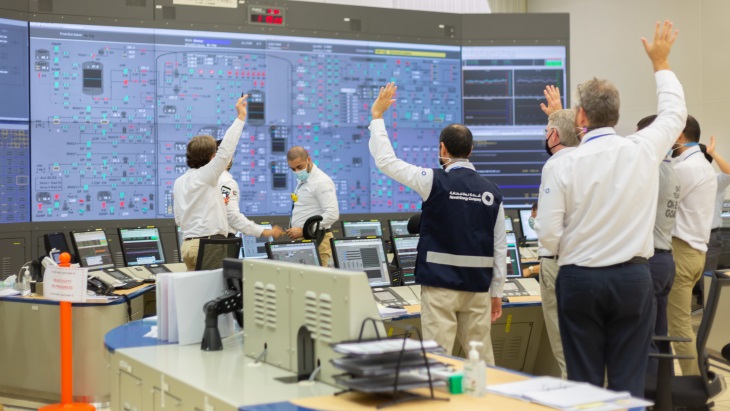Since receipt of an operating licence from the Federal Authority for Nuclear Regulation (FANR) in February, and the completion of fuel assembly loading in March, Nawah has been progressing through a testing programme, prior to completing the start-up of the unit.
Mohamed Al Hammadi, chief executive officer of ENEC, said this was a "truly historic" moment for the UAE. "It is the culmination of more than a decade of vision, strategic planning and robust programme management. Despite the recent global challenges, our team has demonstrated outstanding resilience and commitment to the safe delivery of unit 1. We are now another step closer to achieving our goal of supplying up to a quarter of our nation's electricity needs and powering its future growth with safe, reliable, and emissions-free electricity."
Agneta Rising, director general of World Nuclear Association, said: "This is a great achievement for all those working at Barakah. The reactors there will generate clean electricity, highly skilled jobs and economic growth for many decades. Barakah will soon be joined by reactors under construction in Belarus, Bangladesh and Turkey. We need to see this repeated again and again in more newcomer countries to have truly effective decarbonisation and deliver a cleaner and economically stronger tomorrow."
The UAE is the first country in the Arab world, and the 33rd nation globally, to develop a civil nuclear power programme. ENEC said the Barakah plant is significantly contributing to the nation's efforts to move towards the electrification of its energy sector, and the decarbonisation of electricity production. When fully operational, the plant will produce 5.6 GW of electricity while avoiding the release of more than 21 million tonnes of carbon emissions every year that would otherwise have been produced using fossil fuels.
The UAE Peaceful Nuclear Energy Programme commenced in 2009 and ENEC has worked closely with international nuclear bodies, including the International Atomic Energy Agency and the World Association of Nuclear Operators, ENEC said, "in line with the robust regulatory framework of FANR".
ENEC recently announced it had completed the construction of unit 2, with operational readiness preparations now under way by Nawah. Construction of units 3 and 4 of the plant is in the final stages, with the overall construction completion of the four units now standing at 94%.
Under a USD20 billion deal announced in December 2009, four Korean-designed APR1400 reactors are being built at Barakah by a consortium led by KEPCO. First concrete for Barakah 1 was poured in July 2012, while that for units 2-4 was poured in April 2013, September 2014 and July 2015, respectively.















